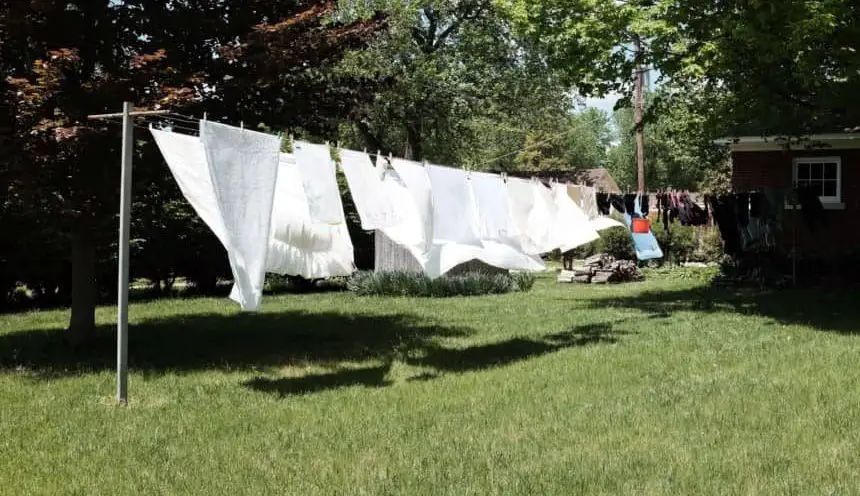
Air drying is the original method for drying clothes. And many still use it today! Whether you prefer air-drying, or if you don’t have access to a dryer, then one of the biggest questions is: How long does it take to air-dry clothes?
Air-drying clothes can take anywhere from 45 minutes to 24 hours, depending on the materials, whether it’s hanging indoors or outdoors, and temperature. For example, denim jeans will take about 3 hours to dry outside in good weather but will take significantly longer inside or if it’s cold.
In addition to the material, and where your garments are hanging, the time it takes to dry is also affected by the size of each garment, whether your clothes have been rung-out thoroughly, and more. Below, we’ve covered all the details you need to become a master air-dryer!
Disclaimer: This post contains affiliate links. This means I may earn a commission should you choose to make a purchase using my link
Table of Contents
How Long Does it Take to Air Dry Clothes?

The ideal environment for air drying clothes is high temperature, low humidity, and good airflow.
But, the amount of time that it will take to air dry your clothes depends a lot on what type of material your clothes are made out of.
Below, we put together a table with fabric types and their typical drying times for indoor and outdoor drying.
The outdoor drying times below assume good weather (e.g. dry, sunny day with a breeze). Actual indoor and outdoor drying times will vary depending on humidity, airflow, how you’ve hung them, etc.
| Fabric Type | Indoor Drying | Outdoor Drying |
| Denim | Up to 24 hours | Up to 4 hours |
| Synthetic Fabrics | Up to 5 hours | Up to 4 hours |
| Silk | Up to 45 minutes | Avoid Direct Sunlight |
| Cotton | Up to 8 hours | Up to 3 hours |
| Undergarments | Up to 2 hours | Around 30 minutes |
| Wool | 24 hours or more (turn inside out halfway through) | Avoid Direct Sunlight |
| Athletic/ Moisture Wicking | Up to 2 hours | Around 30 minutes |
| Comforters | Up to 24 hours | Between 4-12 hours |
| Towels | Up to 24 hours | Between 3-6 hours |
Note: Some items will say, “avoid direct sunlight.” This is due to the natural whitening effect that UV rays have on clothes.
That ought to give you a general rule of thumb for how long air-drying your clothes will normally take. Now we’ll go into more detail for inside and outside drying.
Indoor Air-Drying Tips
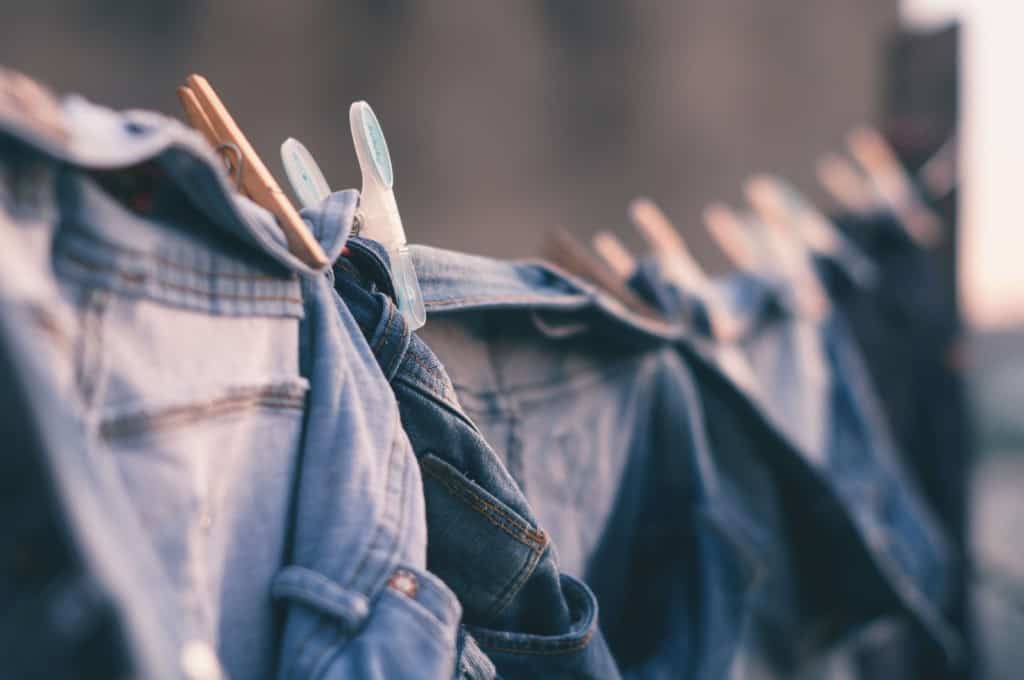
You can dry clothes inside (we do it all the time), but there are several things that will help you make sure the clothes are drying properly.
1. Hang Clothes Promptly
The less amount of time your clothes spend sitting after they have been washed, the greater chance you have of removing wrinkles with drying. This also prevents your clothing from getting a musty smell.
After separating wet clothes, you can either hang them up on a clothing line or lay the heavier items, like wool, on a drying rack.
2. Have Good Airflow
By pointing a fan at your clothes, or using a ceiling fan, you can simulate a breeze to help the drying process.
Good ventilation is key when drying clothes indoors to keep away mildew, mold, and to speed up drying times.
3. Have an Open Window
By setting your clothes in a room that is well-ventilated, moisture is able to leave the garments, and your clothes will dry faster and more completely. This is also important for preventing mold, mildew, and bad smells.
4. Use Generous Spacing
Don’t pack your clothes too tightly together when you hang them. Give those clothes room to breathe! This is particularly important inside and will help your clothes dry better, and more quickly.
If you live in a small apartment with limited space, you can use your shower rod as another clothesline to give yourself more space. Or, look into installing a retractable clothesline (that’s an affiliate link!).
Outdoor Air-Drying Tips
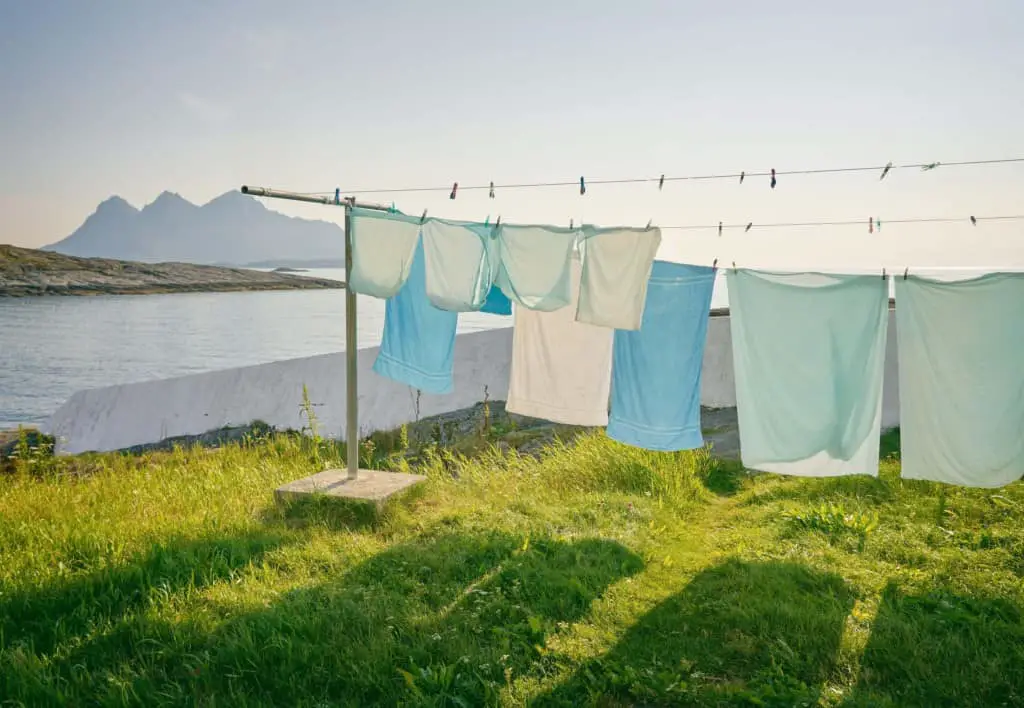
If you’ve decided to hang your clothes outside, then here are a few tips that are particularly important outdoors:
1. Check the Humidity
The type of weather that you are air-drying your clothes in can make a big difference in the time it takes for your clothes to dry. Humid weather tends to keep clothes moist and slows down the drying process. And remember, it can be humid even when it’s sunny outside.
2. If it’s Cold, be Patient
Clothes can dry in cold weather, but it will take longer. If you live in a cold climate area, then it is best to air-dry clothes on a sunny day that has a natural breeze to help speed up drying times.
3. Place Your Clothes Strategically
Some clothes, like jeans, will take longer to dry and should be placed in a sunny location, to help decrease the total drying time. Other clothes, including silk and wool, should not be put into direct sunlight as it will cause the color to fade and damage the clothing faster.
4. Use Generous Spacing
Yep – this is a big one for indoors and outdoors. You need to make sure there is enough space between your clothes. If they are overlapping or too close together, it will slow the drying time.
Now, if you’re in a rush, here are some tips you can use to get your clothes to dry faster.
Tips for Air-drying Clothes Faster
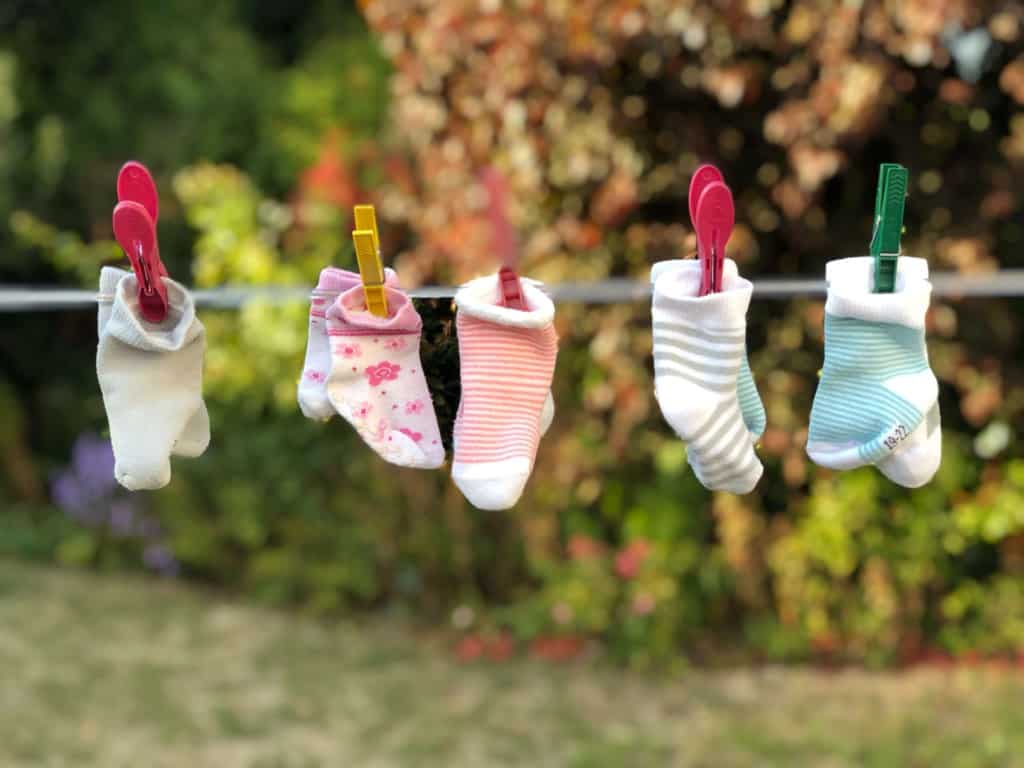
In addition to the indoor and outdoor tips above, here are a few extra tips that can help you accelerate the drying of your clothes if you’re really in a rush:
1. Prioritize Garments for Drying
If you have a few things that you need to get dry ASAP, but other things that are less urgent, consider giving the items you need dried quickly extra space and a prime location (e.g. in the sun/breeze).
Then your other garments can be hung more tightly until your prioritized items are done drying. Be a bit careful with this approach, as you don’t want to accidentally allow your non-prioritized clothes to attract mildew.
2. Wash in Smaller Batches
Similar to point 1, if you have the forethought to plan your drying before washing (if you do, I’m impressed) then you can intentionally wash smaller batches to allow more space and airflow for your smaller amount of clothes.
Large loads won’t get as much excess moisture wrung out in the spin cycle and they make it harder to space your clothes appropriately.
3. Use a Dehumidifier (Indoor Only)
This only applies to indoor drying. If your clothes are drying slowly due to humidity, then consider running a dehumidifier to help reduce the overall humidity in the room. If you need to get one, I’ve heard this one from Amazon is really good (*note: we receive commissions on qualifying Amazon sales).
One other common problem that’s worth mentioning, is how to avoid the dreaded clothing stiffness that can happen with air drying. We’ll cover that next.
4. Extra Spin Cycle
This is an easy thing to do to help decrease the amount of time your clothes will take to air dry.
When you put your clothes through the washing machine, have it set to do an extra spin cycle at the end of the wash.
This will help wring out as many of the water molecules as possible. If your clothes start with less moisture in them, they won’t take as long to dry.
How to Avoid Stiff Clothes
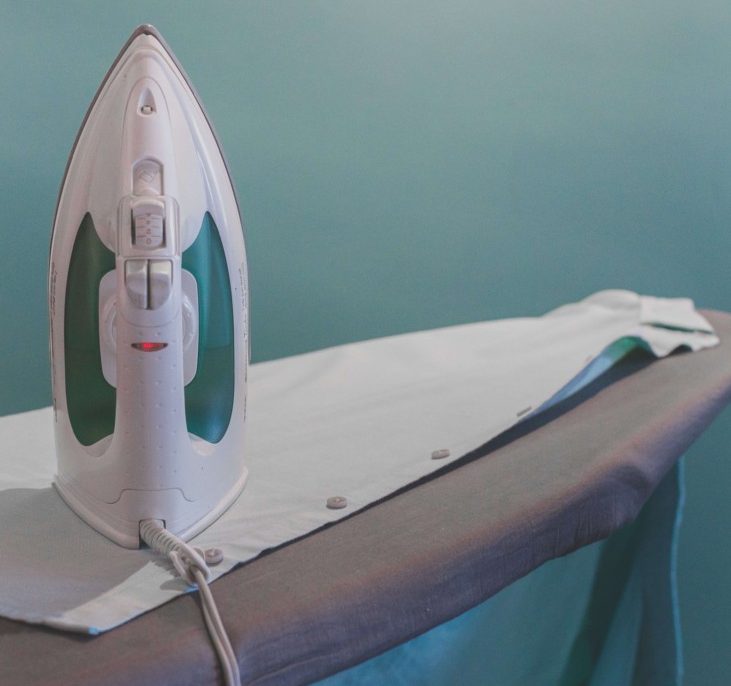
Clothes can become stiff after drying due to laundry detergent that hasn’t completely been rinsed off. Several tips to help remove leftover laundry detergent include:
- Add an extra rinse cycle
- Use detergents that are free of added fragrances and dyes
- Ring clothes well before hanging to dry
- Wash small loads
You might not have this issue, so feel free to try drying your clothes without the above steps. If you’re still having issues with stiff clothing, you could also try using fabric softener in your load of laundry.
However, if you do end up with stiff clothes, try the above tips to make your next batch better.
Benefits of Air-drying
Finally, if you’re on the fence about air drying, then allow me to point out a few of the benefits that air drying can bring.
1. Prevents Static Cling
Static cling is created when clothes rub against each other in a machine dryer. This can be stopped altogether by air-drying your laundry, this also makes the use of dryer sheets unnecessary.
2. Can Give You a Fresh Scent
Depending on your location, a fresh mountain scent or an evergreen tree scent is a bonus of air-drying your clothes. This is especially true if you’re line drying outside, but if you have a nice breeze coming through a window, then you might get it indoors too.
3. Reduces Wear and Tear
Each time that clothing is put into a clothes dryer, there is a chance of damaging the fabric. High heat causes clothing to break down over time, which can cause colors to fade, holes to appear, and fabric to feel thinner.
Air-drying cuts down on both the heat and friction that clothing must endure in the dryer.
This not only helps clothes last longer but is also great for drying delicate items that can get damaged easily.
Tip: One way to tell if your clothes are wearing down in the dryer is to check the amount of lint after each load. A large amount of lint comes from the fibers that have separated from the clothing.
4. Air-Drying Uses Less Energy
One of the best parts of air-drying your clothes is that it doesn’t need to consume any electricity. According to TruEarth, you can reduce energy costs by over $100 a year by line-drying your clothes if you do 4 loads of laundry a week.
I know that’s not a ton of money, but it’s something. More importantly, these energy savings make your weekly laundry routine better for the environment by reducing your carbon footprint.
5. Can Act as Natural Bleach (Outdoor Only)
The UV rays from the sun can have a natural whitening effect on clothes. This acts as a natural bleach for white and other light-colored clothing.
If you are using the sun to bleach your clothes, it is important to lay clothing flat where each piece is hit equally by the sunlight. Turning over the item halfway through the drying process can help prevent uneven whitening from occurring.
Wrap-Up
When deciding to air-dry your clothes, there are several factors that can speed up or slow down the process. But generally, you should be able to get your clothes dried in a day or less with the right conditions.

